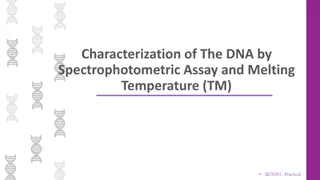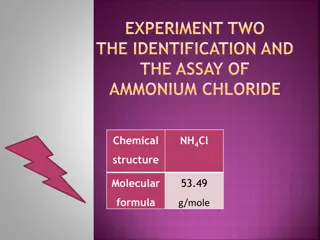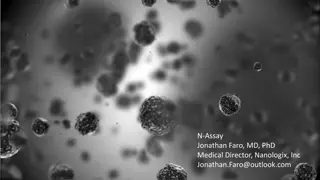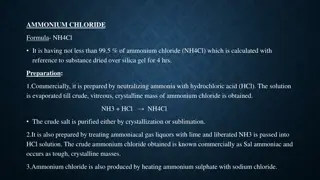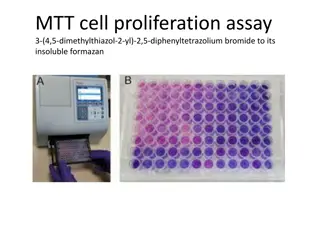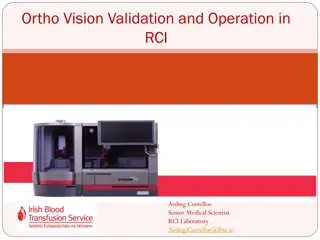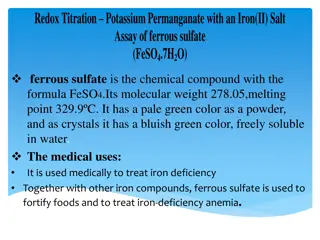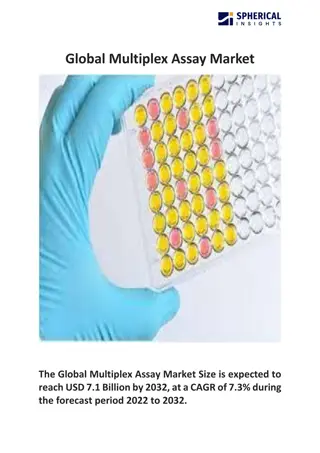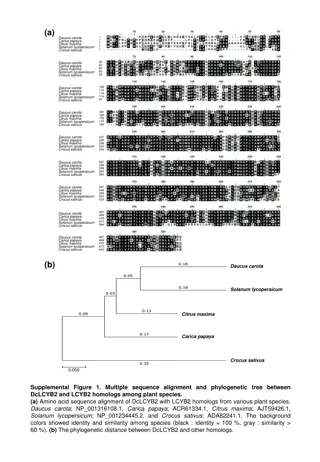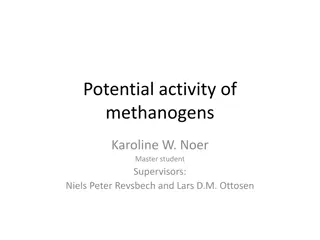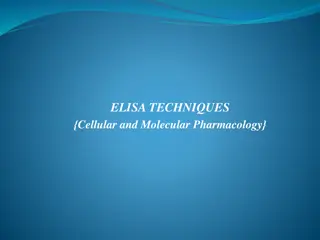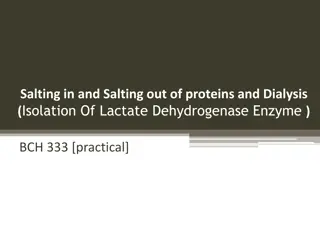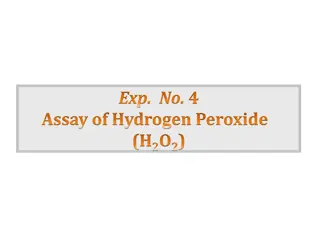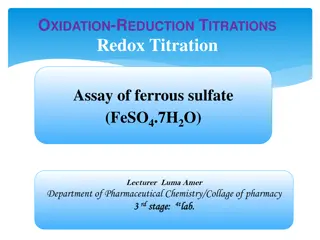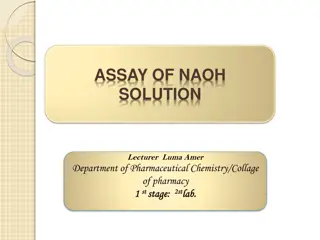Jewellery/silver and the Industrial Revolution
Explore the historical connection between silver craftsmanship and the Industrial Revolution. Discover the regulations, assay offices, and technological advancements that shaped the jewelry industry.
0 views • 5 slides
Understanding Alinity i STAT High Sensitivity Troponin-I for Cardiovascular Diagnosis
Alinity i STAT High Sensitivity Troponin-I is a proprietary assay used in diagnosing myocardial infarction (MI) by quantitatively measuring cardiac troponin I in human plasma. This chemiluminescent microparticle immunoassay (CMIA) aids in the detection of MI, a significant aspect in managing heart d
2 views • 30 slides
Aspirin Assay by Direct Acid-Base Titration Experiment Overview
Exploring the process of assessing aspirin purity through direct acid-base titration using sodium hydroxide as a standard solution. The experiment includes details on aspirin properties, dosage, acidity, decomposition, and metabolism. Key aspects covered include the aim of the experiment, the princi
5 views • 15 slides
Assay of Ascorbic Acid (Vitamin C) - Method and Procedure
Ascorbic acid, known as Vitamin C, is a crucial organic compound with antioxidant properties. This article discusses the assay of ascorbic acid using a redox titration method with potassium iodate and iodide. The principle, procedure, and calculations involved in determining the concentration of Vit
1 views • 8 slides
IVD Contract Manufacturing Services Market - Global Opportunity Analysis and Ind
IVD Contract Manufacturing Services Market by Type (Assay Development, Manufacturing), Category (Reagents, Systems), Technology (Immunoassay, Molecular Diagnostics, Clinical Chemistry, Hematology, Microbiology, Urinalysis) \u2013 Global Forecast to 2031\n
4 views • 4 slides
Comprehensive DNA Characterization Methods in Molecular Biology
Explore the various techniques involved in the characterization of DNA, including spectrophotometric assay, melting temperature determination, quantitative and qualitative analyses, DNA purity assessment, GC content calculation, and DNA denaturation processes. Learn how to determine DNA concentratio
0 views • 12 slides
Identification and Assay of Ammonium Chloride: Experiment Insights
Explore the identification and assay process of Ammonium Chloride (NH4Cl), a weak inorganic acid commonly used in various applications. Discover its chemical properties, synthesis, reactivity, identification tests, and details of a titration process using NaOH and phenolphthalein as indicators.
0 views • 16 slides
Revolutionary N-Assay: Transforming Pathogen Detection in Healthcare
Innovative N-Assay developed by Jonathan Faro, MD, PhD, offers a faster, more accurate, and cost-effective solution for detecting bacterial pathogens in healthcare settings. Unlike traditional assays, N-Assay differentiates between viable and non-viable pathogens, provides information on antibiotic
1 views • 15 slides
Overview of Ammonium Chloride: Properties, Preparation, and Uses
Ammonium Chloride, with the formula NH4Cl, is a compound containing not less than 99.5% NH4Cl. It is prepared commercially by neutralizing ammonia with hydrochloric acid or treating ammoniacal gas liquors with lime. The compound is essential for maintaining acid-base equilibrium, acts as an expector
2 views • 4 slides
MTT Cell Proliferation Assay: Protocol and Applications
The MTT cell proliferation assay is a widely used technique to measure cell viability, proliferation, and cytotoxicity in research. This colorimetric assay involves the conversion of MTT reagent to formazan dye by live cells, resulting in a purple color change. This comprehensive guide provides step
0 views • 8 slides
Ortho Vision Validation and Operation in RCI
Role of RCI laboratory, analyser requirements, validation process, installation verification, and PQ testing for Ortho Vision system. The RCI laboratory plays a crucial role in various testing processes including blood grouping, antibody ID, and compatibility testing. Validation process includes URS
0 views • 17 slides
Redox Titration: Potassium Permanganate with Iron(II) Salt Assay
Ferrous sulfate (FeSO4.7H2O) is used in medical treatments for iron deficiency. This article discusses the redox titration process involving potassium permanganate and ferrous sulfate, along with the chemical principles, procedure, and calculations involved. Potassium permanganate is a powerful oxid
5 views • 7 slides
Comprehensive Research Project Overview
This project overview template provides a structured approach for presenting key aspects of a research project, including the two-year goal statement, project team background, scientific background, research plan, assay feasibility assessment, med chem feasibility assessment, and clinical correlatio
0 views • 12 slides
Understanding Newborn Screening and T-Cell Receptor Excision Circles
The content discusses the importance of newborn screening, characteristics of disorders, T-cell receptor excision circles (TRECs), and the identification of severe conditions like SCID through TREC assay. It highlights the significance of early detection and treatment, emphasizing the value of high-
0 views • 7 slides
Global Multiplex Assay Market
The Global Multiplex Assay Market Size is expected to reach USD 7.1 Billion by 2032, at a CAGR of 7.3% during the forecast period 2022 to 2032.\n\n
1 views • 7 slides
Understanding the Hydrolytic Activity of Salivary Amylase on Starch
Enzymes play a crucial role in catalyzing chemical reactions in the human body. This experiment focuses on the hydrolytic activity of salivary amylase on starch, breaking down polysaccharides into intermediate products like maltose. The mechanism of amylase action, types of amylase, and the assay me
0 views • 16 slides
Plant Enzyme Activities and Phylogenetic Analysis
The content discusses the alignment of various plant enzyme amino acid sequences, including DcLCYB1, DcLCYB2, and DcLCYE, among different inbred lines. It also explores the construction of DcLCYs for enzyme activities using an E. coli complementation assay. The phylogenetic relationship between DcLC
0 views • 5 slides
Potential Activity of Methanogens in Anaerobic Digesters Study
Investigating the potential activity of methanogens in anaerobic digesters with and without hydrogen addition. The goal is to estimate methane production and compare upgrading potential using a specific assay method. The study involves collecting material from reactors, incubating in specific gas mi
0 views • 10 slides
Rapid Elemental Analysis of Human Fingernails Using Laser-Induced Breakdown Spectroscopy
Elemental analysis of human fingernails is conducted using Laser-Induced Breakdown Spectroscopy (LIBS) to diagnose and monitor zinc deficiency in the body. Zinc deficiency is a significant health issue globally, affecting billions of people. By utilizing LIBS technology on fingernail samples, resear
0 views • 15 slides
Assay of Aspirin by Indirect Acid-Base Titration
Indirect titration, also known as residual titration, is an analytical technique used to determine the weight of an unknown sample by employing excess standard solution. In the case of aspirin, which is a weak acid undergoing slow hydrolysis, back titration with NaOH and HCl is utilized to overcome
1 views • 13 slides
Nuclear Non-Proliferation Treaty Compliance Measures Overview
Detailed overview of the measures implemented for verifying states' compliance with the Nuclear Non-Proliferation Treaty (NPT), including design verification, analysis of declarations, on-site inspections, assay of nuclear materials, and containment/surveillance techniques. The process involves dest
0 views • 9 slides
Detection of Mutations in EGFR in Circulating Lung Cancer Cells: Study on SARMS Assay and CTC-Chip
This study by Shyamala Maherswaran, Ph.D., and team focuses on characterizing mutations in EGFR in circulating tumor cells using SARMS assay and CTC-chip. The research investigates the effectiveness of these non-invasive methods in analyzing tumors and explores the role of the T790M mutation in resp
0 views • 12 slides
Understanding ELISA Techniques in Cellular and Molecular Pharmacology
ELISA (Enzyme-Linked Immunosorbent Assay) is a vital immunological technique used in detecting antigens or antibodies in samples. This article covers the types of ELISA tests, such as Direct, Indirect, and Sandwich, along with the principles and applications of ELISA in diagnosis. The process involv
0 views • 18 slides
Understanding ELISA: Principle, Types, and Applications
ELISA (enzyme-linked immunosorbent assay) is a widely used laboratory technique for detecting and quantifying antigens or antibodies in blood samples. Introduced in 1971, ELISA involves an antigen-antibody reaction using enzyme-conjugated antibodies to generate a colored product on a plate. There ar
1 views • 14 slides
Protein Isolation Techniques: Salting In and Salting Out
Proteins exhibit varying solubility based on salt concentrations, with salting in increasing solubility and salting out causing precipitation. This practical involves isolating lactate dehydrogenase enzyme using salting in, salting out, and dialysis techniques, as well as assessing purity through ac
0 views • 19 slides
Assay of Hydrogen Peroxide (H2O2) - Experimental Study
Hydrogen peroxide (H2O2) is a weak acid with both oxidant and reductant properties. It is an unstable compound that decomposes into oxygen and water. This experiment involves titrating hydrogen peroxide against a standard oxidizing agent solution to determine its concentration. The physical and chem
0 views • 9 slides
Nonparametric Tolerance Interval Approach to Immunogenicity Assay Cut Point Determination
This content discusses the importance of determining the cut point for immunogenicity assays to detect anti-drug antibodies (ADA) in large-molecule therapeutics. It highlights the need for well-developed and validated assays to ensure drug efficacy and safety. The approach involves multiple-tiered v
0 views • 26 slides
Analyzing Ibuprofen Tablets: Experiment, Properties, and Testing
Ibuprofen, a non-steroidal anti-inflammatory drug, is examined through experiment, physiochemical properties, dosage forms, synthesis, and assay testing. Its identification tests include melting point, UV absorption, IR spectrum, and TLC analysis. The assay test method involves weighing and processi
0 views • 22 slides
Assay of Ferrous Sulfate (FeSO4.7H2O) by Redox Titration Experiment
This experiment involves determining the weight and weight percentage of an unknown sample of FeSO4.7H2O through a redox titration using potassium permanganate solution. Ferrous sulfate, a chemical compound used in medical treatments, is oxidized to ferric sulfate in the presence of sulfuric acid. T
0 views • 9 slides
Assay of NaOH Solution - Lab Procedure for Determining Sodium Hydroxide Content
This essay discusses the assay of NaOH solution, focusing on the two-step titration process involving NaOH and HCl for determining the concentration of NaOH. Detailed procedures, chemical factors, and calculations for both titration steps are explained in depth. The analysis also includes the ration
0 views • 10 slides





